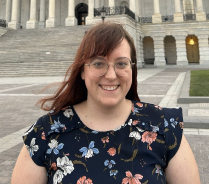Consumer struggles with Native American healthcare
By Sam Sears, Health Policy Associate, National Consumers League
My name is Sam Sears, and I am the new Health Policy Associate working at the National Consumers League. I am excited to be working with Robin, Sally, and the rest of the staff at NCL. Consumer issues regarding health care, specifically access and confidence, are wide-reaching and I am thrilled to be able to lend my growing expertise and experience to support the cause and NCL.
I always thought I would end up in healthcare, but my younger self had always envisioned my work with a much more narrowed focus. Academically, my background is in policy and gender studies, where I focused on equal protections for women and queer, specifically related to intimate partner violence and protections and reproductive justice. After graduation, I worked as a barista while also taking placements through a temp agency here in DC, focusing on nonprofits and advocacy organizations. It was, in part, due to the temp placements that I found myself working on broader health policy issues such as the 340B Drug Pricing program and health care access for individuals.
Before joining NCL, I worked at the National Council of Urban Indian Health (NCUIH) for two years, where I was able to learn quite a bit about the healthcare delivery system for Native Americans and the barriers to access that they often face. While NCUIH’s focus is centered on ensuring that Native Americans living in urban settings have access to quality, accessible, and culturally competent health services, much of the work is done collaboratively with other advocates and organizations working within the space. Because of this, my work at NCUIH often was encompassing issues facing the larger community.
Upon joining NCL, I realized that a prominent problem for Native Americans is a much larger area of concern for all Americans and their healthcare – the pervasive and misleading Medicare Advantage plan advertisements seen on television. In fact, in a letter to Centers for Medicaid and Medicare Services (CMS) and Dr. Brooks-LaSure, the CMS Tribal Technical Advisory Group, a group of 17 representatives comprised of elected Tribal leaders or appointed representatives and representatives of national Indian organizations headquartered in DC, highlighted how Medicare Advantage (MA) plans have been “aggressive and invasive when marketing their plans”.
A Kaiser Family Foundation report on the 1,200 unique ads, mostly for MA plans, aired during the enrollment window found that 27% led beneficiaries into thinking they were being recruited for traditional Medicare plans. For Native Americans, this aggressive marketing has led people to enroll in plans that do not include local Indian Health Service providers, meaning they lose coverage and no longer able to go to the doctors they trust to care for them in a culturally competent manner. This confusion is not limited to just Native Americans, as Dr. Brooks-LaSure has stated previously.
It’s important to note that CMS has been addressing the misinformation and confusion from these ads. In April of 2023, the agency released a final rule regarding Medicare Advantage marketing and communications, amongst other Medicare part plans and related topics. Specifically, CMS must now pre-approve all television MA plan advertisements that will air during the open enrollment period, minimizing the opportunity for misinformation and predatory practices within the ads. CMS has also significantly increased its ability to investigate complaints about misleading agents and advertisements. This regulation, while large and with rolling applicability dates, will apply to the 2024 contract year for MA plan marketing and communication, meaning that the open and re-enrollment period at the tail end of the 2024 calendar year will be drastically different.
As I stated earlier, many of the issues that I had worked on while with NCUIH are also applicable to the broader population and community who struggle with access to healthcare. So, I am excited to be able to continue to work on these consumer issues with NCL. And I am eager to see how NCL could support and expand on the work I’ve been able to touch on through my other positions.
###
About the National Consumers League (NCL)
The National Consumers League, founded in 1899, is America’s pioneer consumer organization. Our mission is to protect and promote social and economic justice for consumers and workers in the United States and abroad. For more information, visit nclnet.org.













